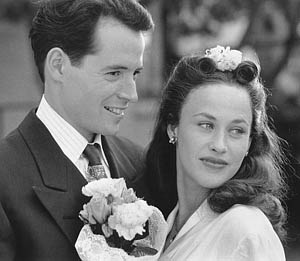
 |
InfinityMaking Richard Feynman’s Life Look Boring |
Title: Infinity
Director: Matthew Broderick
Starring: Matthew Broderick, Patricia Arquette
Released: 1996
Running Time: 1 hour, 59 minutes
MPAA Rating: PG
Freak Nation Rating: ![]()
![]()
![]()
![]()
Buy It From: Amazon.com
You’d think a movie about Richard Feynman’s life, based on the tales and vignettes in Surely You’re Joking, Mr. Feynman! and What Do You Care What Other People Think?, would be a sure-fire winner. Both books sparkle with Feynman’s wit, and while a movie based on such a series of vignettes might be a little jumpy in its pacing, Feynman’s own character, and the knowledge that all of this stuff actually happened, should more than make up for it. Right?
Wrong.
In Matthew Broderick’s hands, everything about this movie that should have sparkled or scintillated somehow manages to be drab and lifeless instead. Even the pacing, rather than seeming jerky or staccato — which would have been an acceptable flaw, based on the anecdote-driven source material — instead finds an unacceptable way to be flawed: it’s lethargic. It’s yawn-inducing. It meanders languidly from one isolated scene to another, rarely connecting them or giving any coherent trajectory through the course of the main characters’ lives.
The blame has to fall squarely on Broderick’s shoulders: in addition to starring as Feynman, he directed and co-produced the picture. Since his mother Patricia wrote the screenplay (as well as being the other producer), it’s hard to imagine he didn’t have some input into the script as well. The decision to make the movie “a love story” (as its subtitle tells us) by focusing on Feynman’s time with his first wife, Arline, is an interesting and creative one; after all, not many people would look at a Nobel-winning physicist and think “romantic lead”. But that decision binds the movie up with too many restrictions: by focusing on Feynman’s time with Arline (who died shortly before the Trinity test detonation), it leaves the rest of his life off-limits.
 Matthew Broderick and Patricia Arquette play Richard Feynman and his first wife, Arline, in Infinity. |
So Feynman’s time visiting Brazil and drumming with a samba band is completely gone. His adventures in seedy bars in Buffalo in the late ’40s? Gone. His wild antics in the early days of Las Vegas, when he mingled with showgirls and bookies, and discussed statistics with Jimmy the Greek? Light-years away from this movie’s boundaries. And don’t even dream of seeing him dunk bits of the Space Shuttle Challenger’s O-ring material in ice water to debunk a bureaucrat’s claim that cold couldn’t have rendered them brittle. All those things lie in the years after Arline’s death from tuberculosis; this movie breathes not a word of them.
What’s particularly maddening, though, is the way it omits or bungles scenes from Feynman’s earlier life, before Arline’s death and the Trinity blast. For example, there isn’t even a mention of Feynman’s hilarious and historic safe-cracking pranks during his time at Los Alamos. Nor is there any depiction of him drumming and dancing on a mesa near Los Alamos, giving rise to the rumors of “Injun Joe” — instead, we see Richard and Arline visiting some Native American ruins for a picnic, in an idyllic and utterly forgettable scene.
The only thing worse than the wonderful episodes of Feynman’s life that are omitted is the episodes that are depicted. For example, when he’s on an early date with Arline, and they run into a Chinese merchant with an abacus, Feynman gets into a calculating contest: his mental arithmetic against the other man’s abacus skills. “More numbers! More numbers!” Feynman famously insisted in Surely You’re Joking, Mr. Feynman! But here, the scene has no energy; it’s just a humdrum encounter in an otherwise humdrum life, leading to Matthew Broderick matter-of-factly tossing off the line “He doesn’t really understand numbers.” Later, Feynman discovers a hole in the fence at Los Alamos, and uses it to leave the base surreptitiously while entering publicly at the main gate — multiple times in a row, without corresponding exits! The collision between Feynman’s tongue-in-cheek pranksterism and the U.S. Army’s rigid bureaucracy is the stuff that Abbott and Costello would have dreamed of, and yet in Infinity, it plays about as funny as watching extended footage of a leaky faucet dripping.
So maybe it’s a good thing they didn’t leach all the humor out of Feynman’s safe-cracking and other exploits.
The movie’s excuse for handling all of Feynman’s greatest Feynman-isms so poorly is that it’s not about Feynman; it’s about the love story between Richard and Arline. But that explanation doesn’t wash; while the movie starts with Richard’s boyhood, we don’t see Arline until Richard does, when he first meets her at a party in his late teens or early twenties. Indeed, the scene is framed so that we essentially see her through Richard’s eyes. We also see Richard’s reactions (and the Trinity nuclear test) after Arline’s death; the story starts before her, ends after her, and is told, completely, from Richard’s point of view.
The movie, then, really is a Richard Feynman biopic — but one that leaves out huge portions of his life to focus solely on one aspect of it. That might work for a bio of someone like Pablo Picasso, whose life was mostly defined by his artistic work, or Margaret Thatcher and her political career. But Feynman is known partly for his refusal to be restricted to the world of physics alone — from playing bongo drums to frequenting topless bars, he refused to be pigeonholed.
But this movie’s not content to shoot itself in the foot by unsuccessfully attempting to straddle the divide between biography and love story. In addition, it has to go ahead and shoot itself in the other foot by simultaneously trying to provide flashes of art-house foreshadowing of the Trinity atomic test. These are all wordless, and sometimes done in silhouette: pantomime shows of the preparations for the blast, set to portentous music.
If that sounds bad on its own, now imagine it sandwiched in between scenes of young love, and Richard explaining nuclear physics to Arline using everyday items as teaching aids. Any momentum the film starts picking up, it makes sure to immediately squander on these leaden bricks of foreshadowing. They’re like the control rods running through a nuclear reactor’s core, dampening the radiation that keeps it running, squelching any possibility that this movie’s energy will ignite any sparks in its viewers.
Broderick and Arquette do a perfectly credible job with the acting. Although Broderick doesn’t quite come off as being “born to play the role of Feynman”, he does manage to use his Brooklyn accent to good effect, and he got some experience playing geeks and lovable rogues in two of his first big roles (David Lightman in War Games and Phillipe the Mouse in Ladyhawke). Both of these serve him well here. For her part, Patricia Arquette does a nice job of showing us Arline’s early vivacity and sparkle, then fades it gradually into a grey tiredness as tuberculosis takes her. She could probably do more given more screen time. For the acting, this movie gets a half-star.
For its various other ways of making its audience want their two hours back, that half-star is all it gets. If you like Feynman, read his books, but don’t waste your time with this movie.
Kai MacTane is the Freak Nation’s Webmaster. He’s read Surely You’re Joking..., but hasn’t read What Do You Care... yet. If he won a Nobel prize, he’d still want to hang around in seedy bars — though probably not in Buffalo, New York. Contrary to common reports, he has not become death, the destroyer of worlds.